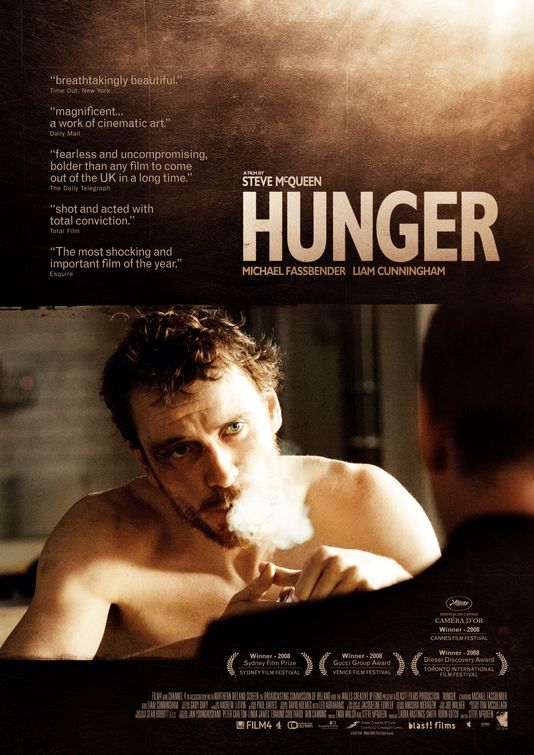
iMDB
Treileris
London born director Steve McQueen has said there were three
powerful influences on his boyhood in the early 1980s: the riots in Brixton,
Tottenham winning the Cup Final, and Bobby Sands. As the IRA hunger strike
progressed at Maze Prison in 1981, Bobby Sands appeared on television every
night, literally wasting away. It left a lasting impression on McQueen, and for
his first feature film, the Turner Award-winning artist presents Sands' story
in a fashion that will scorch your eyeballs.
The film stars Michael Fassbender as Bobby Sands, the Provisional Irish Republican Army (IRA) volunteer who led the 1981 Irish hunger strike and participated in the no wash protest (led by Brendan "The Dark" Hughes) in which Republican prisoners tried to regain political status. It dramatises events in the Maze prison in the period leading up to the hunger strike and Sands' death. The hunger strike, which attracted widespread support throughout Ireland, eventually led to the death of ten prisoners including Bobby Sands but ushered in a period of compromise and reconciliation that resulted in the Good Friday Agreement of 1998 and the ultimate end of the armed campaign. "Hunger" is not comfortable to sit through, especially as we witness Sands' slow physical deterioration, yet it stands as a solemn reminder of the inhumanity that occurs when democratic rights are flouted, from the Holocaust to Abu Ghraib. It is a brutal, stomach-turning film that reinforces the poisonous hatred that human beings are capable of, yet, through the beauty of its art, opens the door wide enough to allow us to also glimpse the strength of the human spirit.
Hunger is the startling film debut by the Turner Prize winning English video artist Steve McQueen. Set in the Northern Irish Maze Prison in 1981, Hunger begins during the notorious Blanket and No-Wash protest, led by Irish Republican Army prisoners who wanted political prisoner status. While the focus of the film is initially on one of the prison guards and a new prisoner, the later part of the film centres on Bobby Sands (Michael Fassbender from 300) who led the hunger strike that would eventually kill him.
McQueen’s background as a video artist is evident in Hunger‘s powerful visual texture. Every shot is carefully constructed with an astonishing awareness of the moving image and the detail McQueen gives to the human by-products, which result from the two strikes, is both revolting and inexplicably beautiful.
Hunger is the true embodiment of an Art Film – there is no clear protagonist for most of the film and there is almost no dialogue, except for one long and utterly engaging conversation between Sands and a priest that plays out like a philosophical chess game. Hunger is completely captivating and an artistic triumph to be savoured.
The film is notable for an unbroken 17-minute shot, in which a priest played by Liam Cunningham tries to talk Bobby Sands out of his protest. In it, the camera remains in the same position for the duration of the shot. To prepare for the scene, Cunningham moved into Michael Fassbender's apartment for a time while they practiced the scene at least twelve times a day, sometimes repeating the scene fifteen times in a single day. It is the longest shot in a mainstream film.
But for all its brutality, Hunger is only as political a film as the viewer wants it to be. The outcome has already been written for the participants' fate, one can choose to walk away with only having seen the meticulous craft that went into things like an emotionally-gutting scenes that consists of only a fly and a snared piece of barbwire fence. One can also view it through a post-9/11 lens to be reminded that institutions have never been well-equipped to deal with a small group of ardent believers.
The looseness of these threads is the mark of a director who
understands there are still complexities within the extremes of human behavior,
without hesitating to show how paranoia and mob mentalities can bubble up in
repellent ways under oppressive circumstances. It's an astonishing film in any
respect, but as a directorial debut feels particularly brave.